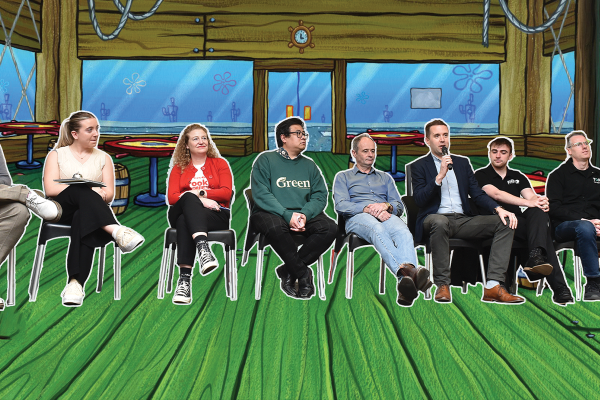With all major parties (bar ACT, surprisingly enough) wanting a slice of the student voting pie, OUSA in conjunction with POLSA hosted a high-octane debate in the union hall at 1pm last Wednesday. The result was largely underwhelming, as candidates showed the utmost respect for one another in attempts to save face for their parties. Boo, get the claws out next time.
Still, there were a few golden moments in the one-and-a-half hours of unceasing yarns, moments which Critic Te Ārohi will feed back to you in a cryptic fashion leaving you more confused than you were before the article started.
The dogs in the fight were Labour’s Rachel Brooking, Green’s Francisco Hernandez, the independent Jim O’Malley, National’s James Christmas, NZ First’s Keegan Langeveld, and TOP’s Ben Peters. One curious omission from the debate was National’s Dunedin candidate Michael Woodhouse, who has been a bit AWOL since he removed himself from the party list earlier this year. Also sorely missed was New Conservative’s Paul Deacon, who at a OUDSA (debating club) debate the Friday prior got the whole squad laughing when he bluntly announced climate change was an ideological ploy designed by the government. Good chat bro.
Keeping the candidates honest was OUSA President Quintin Jane alongside POLSA’s (politics club) Lily Stock, who were tasked with the all-important job of heartily tapping the bell when the candidates spent too much time speaking. Quintin also intervened when a member of the crowd asked candidates, “What is a woman?” stopping Peters from speaking in efforts to preserve the sanctity of all members of the crowd. Slay Quintin.
Aside from this question, the crowd mostly sought to ascertain policies on wealth and climate, bluntly voicing the rage of an indentured student community. James Christmas also blushed when asked to fess up about the whereabouts of his Dunedin paramore.
In general questioning, each party was given plenty of breathing room to speak about policy on tax, climate, and housing. The person with the most breathing room was independent Jim O’Malley, who was free to wax lyrically about the evils of neoliberalism without having to stick to party policy. Ben Peters also shared a similar advantage, taking the time to inform the audience that “Dunedin is a flat city, other than the hills themselves.” The people who got the least speaking room were representatives of the Electoral Commission and Generation Vote who sat idly beside the main stage, pleading silently to audiences that they should probably enrol at some point.
As such, the audience generally took to the minor parties, though the Greens got the greatest hoots of support. It’s hard to say who won. Was the real winner at the end of the day then perhaps debating itself? Probably not. See below to have your take on the matter.
On the matter of housing, Labour’s Rachel Brooking said “we plan to build 27,000 for 2027.” Ah, isn’t it great that dreams are free? Greens’ Fran Hernandez said that “we side with renters” and that the party “supports a landlord register.” Independent O’Malley said that “housing is a right” and that us nomadic students are “living a transient life.” James Christmas, whose name would suggest ample knowledge about the intricacies of indoor heating, took a page out of the National Party handbook and said that “it’s a supply issue.” We did not ask him anything about chimneys, or if it would be possible to stave off the winter cold by supplying students with their annual coal allowances in July, rather than the Northern Hemisphere-centric December, when coal is pretty useless. To finish the housing part off, Peters touted the benefits of a land value tax.
Then, the topic on everybody’s mind: taxes. Labour has ruled out a capital gains and wealth tax, so everyone is wondering how the fuck we’re meant to be funding public services. Brooking contended that there is “bipartisan support in our tax system,” while Hernandez fired back by saying that we need to “redistribute wealth so we can properly fund the services we need to.” O’Malley echoed a similar sentiment, saying that “wealth is accumulating at the top of our society, and we need to bring it back.” Christmas didn’t offer up much apart from “Muldoon was basically a socialist,” which is… certainly a take. Langeveld mentioned “the books are in bad shape”, and Peters refined his earlier statement, saying that he’s all about “a tax on land, specifically.”
Now, for the most highly anticipated and existential question of our generation: climate change. Brooking started off by saying that “the ocean is a wonderful place,” and she’s so real for that. She also mentioned the importance of “fishing controls and marine reserves.” Hernandez wasted no time to spark anxiety, saying “we’re living in a climate emergency” and that we “needed to save 30 percent of our ocean for reserves by 2030.” O’Malley kept it simple, saying “get us some help,” with Christmas saying we needed to “rapidly increase the production of renewable energy” which is ironic coming from a party who wants to repeal the ban on offshore oil and gas exploration. Langeveld mentioned something about “farm-level reporting emissions.” Peters said we needed to “increase public transport and city density” and that it was important to “cap total emissions.”
And that was about that.






